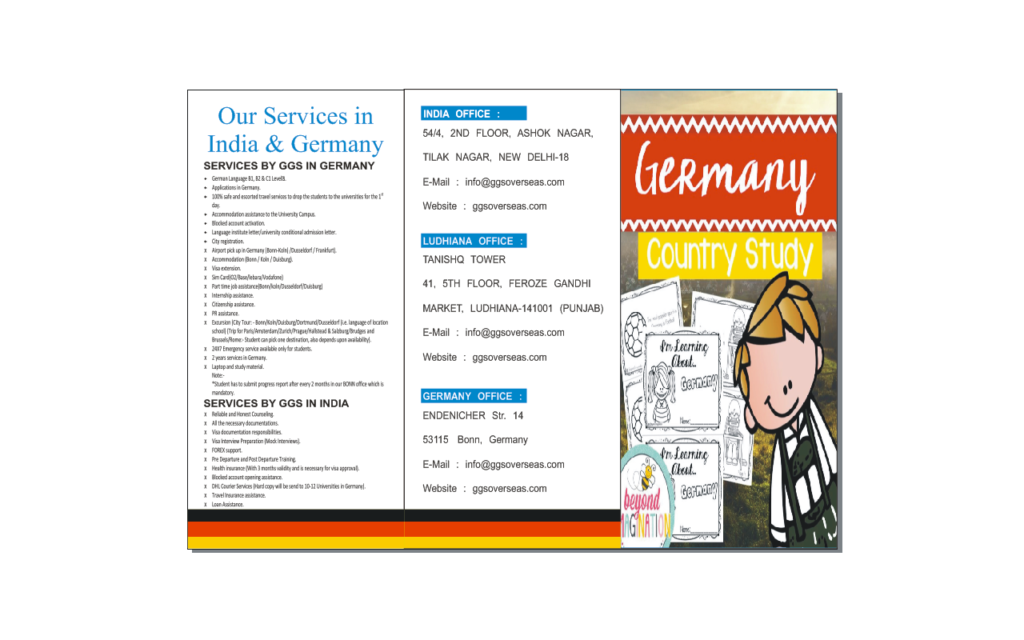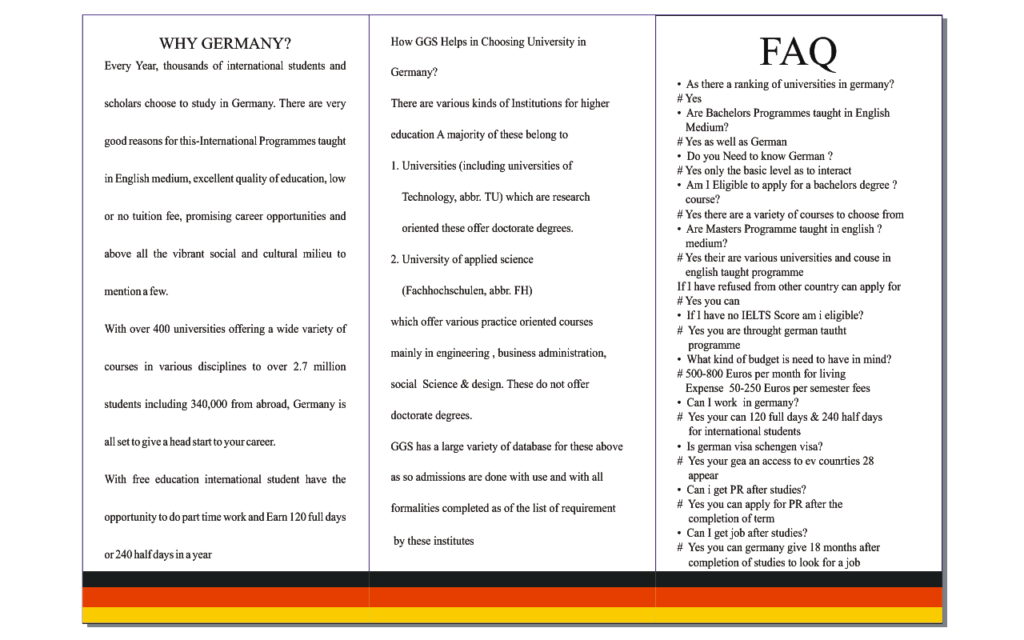
Why Study In Germany
Germany is one of the most popular study destinations in the world, and with its trendy student cities. Benefit from a high quality educational system to help you advance in your career, learn a new language by making new friends and socializing with other students, and gain an amazing life experience to remember for years to come by studying and living as a foreign student in Germany.
There are around 400 institutions of higher educations in Germany, many of which offer English-taught study programmes – about 1,000 in total. Many German universities score high in international rankings. Germany holds its strong presence worldwide in terms of technology and market value, and it is a prime destination for international students despite the fact it is a non-English speaking country.
Cost of Living for International Students
The average living costs for international students range between 700 to 1000 EUR/month including accommodation, food, public transport, etc.
Scholarships and Funding Opportunities
Many scholarships in Germany are offered by the government or by universities. This option can help you to cut down the maximum expenses while studying Abroad.
Study and living Abroad could turn into a great learning and living experience. You can explore magical places and in beautiful countries, visiting ancient monuments while studying in one of the best destinations.


Do You Need a Visa To Study In Germany?
⦁ studies that last up to 3 months, you need a Schengen visa.
⦁ For studies that last more than 3 months, you need a German national visa
If you enter Germany with a national visa you have to extend your stay by getting a German residence permit for studies at the Foreigner’s Office. You should do this while your entry visa is still valid.
The first thing you’ve got to do is to find out if you need a visa to study in Germany as an international student, and if you do, what type of visa you need to apply for considering the length and nature of your planned studies.
Types of Germany Study Visas
You may be issued a Germany visa for studies for a range of study levels and degrees. This includes undergraduate, exchange, graduate, or postgraduate studies. This also covers participation in a pre-academic measure or in a non-academic German language course.
There are three types of Germany student visas you can apply for:
- German Student Visa. This is the standard student visa for international students who have been admitted to a German university and are ready to start their studies at a full-time university program.
- German Student Applicant Visa. You need this visa if you need to be in Germany to apply for university admission in person. This visa doesn’t allow you to study in Germany, it’s only valid for the university application process.
- German Language Course Visa. You need this type of visa to study for a German language course in Germany.
Proof of Financial Resources “Finanzierungsnachweis”. (One of the following)
⦁ €10,236 deposit confirmation at a ⦁ German blocked bank account.
⦁ Letter of commitment and evidence of your parent’s income records and financial assets.
⦁ Letter of commitment by a German resident “Verpflichtungserklärung”. This letter is taken at the Alien’s Registration Office, by the German resident whose going to cover your costs during your studies.
⦁ Scholarship awarding certificate. It must show the amount of costs it covers.
⦁ Bank guarantee. Issued to you by a recognized German bank.
Important Tip: To Highly Increase Your Chances of Getting Your Student Visa You Should Use a Blocked Account as Proof of Financial Resources.
A blocked account is a special type of bank account for international students in Germany, to prove you have enough funds to live in Germany for one year during your studies.
As of 2020, it is estimated that a foreign student in Germany will spend an average of €853 euros per month at a minimum for living expenses. So, you need to have €10,236 in your bank account before applying for a German student visa.
- Proof of University Admission.
- Confirmation of admission in studies “Zulassungsbescheid”. Issued by a recognized higher education provider in Germany, showing when you’re starting your studies and the language of teaching.
- Proof of conditional admission “Bedingter Zulassungsbescheid” and a confirmed intensive course “Intensiv-Sprachkurs”. The letter must show you’re conditioned and confirmed to participate in an intensive language course before getting the final university admission. The course must last more than 6 months, with not less than 18 hours of lessons in a week.
- Proof of conditional university admission.
- Letter from “uni-assist”.
- Confirmation of admission as an applicant.
- Communication with the university, regarding conditions for final admission.
- Proof of having paid the language course. Accompanied by a confirmed place in the course. The payment must cover at least 3 first months.
- Confirmation of admission in a university preparatory course “Studienkolleg”.
- Proof of conditional university admission.
- Letter from “uni-assist”.
- Confirmation of admission as an applicant.
- Communication with the university, regarding conditions for final admission.
- Proof of having been confirmed as a participant in the course.
- Evidence of your earlier education.
- Original school-leaving certificate.
- Degree certificate. (If you’re entering Master or PhD studies).
- Student Health Insurance.
- University entrance qualification.
- Certificate of German or English Language Proficiency.
When To Apply For a German Student Visa
The best time to apply for a German student visa is immediately after receiving the university letter of admission and securing the necessary funds to live and study in Germany.
This is one of the most important requirements and if you haven’t been awarded an official scholarship, you need to provide proof of financial resources through other means such as having the funds deposited in a German blocked account.
Germany Student Visa Processing Time
On average, it takes up to 25 days for your German student visa application to be processed. The processing time varies depending on the country and the German embassy you apply at.
All other German visa applications for studies are normally processed within 3 months.
German Student Applicant Visa
A German student applicant visa is the visa to apply for if you are planning to go to Germany to apply for university admission in person.
This visa is initially issued for three months, but can be extended for another six months upon your arrival in Germany if necessary.
If in six months you receive the awaited letter of admission in full-time university study program or a university preparatory measure you’ll be able to switch into a German student visa or a residence permit for studying.
Which language proficiency certificates are valid for studying in Germany?
The recognized German language certificates for studying at a German university are any of the following:
- TestDaF level IV. For having passed the TestDaF, Test of German as a Foreign Language for Foreign Students in all sections.
- DSH Certificate II or III. For having passed the DSH test, the German Language Test for Admission of Foreign Student Applicants.
- Assessment test at the end of institutional preparatory classes.
- DSD Certificate of level II. Language diploma of the permanent conference of ministers for education and culture affairs, level II.
- Goethe Certificate C2. For having passed the Goethe Test of level C2.
- Telc Deutch C1 or B2 Hochschule Certificate. For having passed the Telc C1 or B2 Hochschule tests. To prove proficiency of English language, send any of the following certifications below::
- Official Score Report of TOEFL Test. The required scores: IbT-88, Pbt-66.
- Official Score Report of IELTS Test. Sent directly or to you by the British Council. The required group score in the IELTS Academic must be 6.5+.
- Cambridge Advanced English Certificate A, B, or C. Together with Cambridge Proficiency English Certificate A, B, or C.
- Alternative forms are exceptionally accepted.
Keep in mind that certain universities can have their own language proficiency requirements and not all language test and scores are accepted.
What are the transcripts of grades from earlier studies?
It’s the official document that your university/other HEI where you’ve previously studied at issues, showing all grades received during studies. It has to be signed and sealed.
What’s an accreditation certificate?
It’s a document issued by the relevant national ministry of education or similar national authority for recognition of an education provider or/and study program. By having this document you can confirm that your qualification is received by a state-approved provider.
What’s notarization of documents?
Notarization (also known as authentication) means that photocopies of your original documents must hold the official seal and authentic signature of the relevant authority.
The rule is irrelevant for signatures, certifications, and verifications provided in digital form.
What does the equivalence to bachelor/master degree in Germany mean?
If you want to start master studies in Germany after previously studying completing i.e. Bachelor degree studies outside the Bologna process, you must confirm the equivalence of these studies with Bachelor studies in Germany. You must get this document from the provider of such earlier academic degree.
What’s a curriculum for studying in Germany?
Curriculum for studying in Germany is a document with all understanding and skills obtained in your previous studies are listed in. However, such potentials must have relation to the requirements for the specific university program you’re applying.
The curriculum must be accompanied by a catalog of relevant study modules, where a detailed description of a degree program, department, division and university is offered.

We also provide assistance for
Admission Guidance
Scholarship Assistance
IELTS/ TOEFL Preparation
Organising On-Spot Admissions
Accommodation Assistance
Visa Assistance
Travel Assistance
Pre Departure Briefings
Career Counselling
Choosing the right course in the right university
Complete information about Educational Institutions
Get Query
